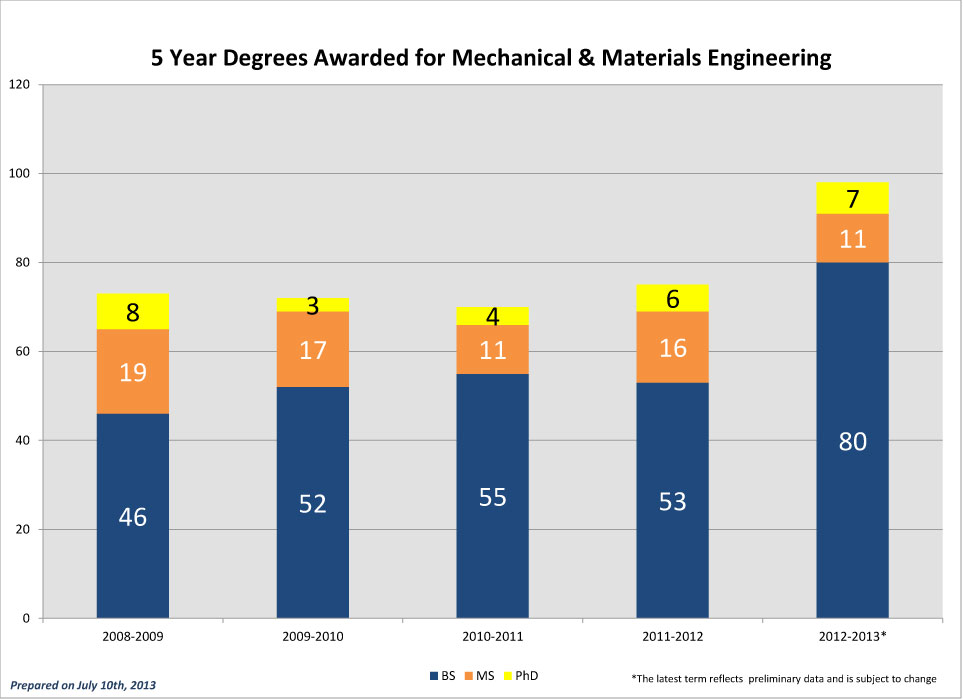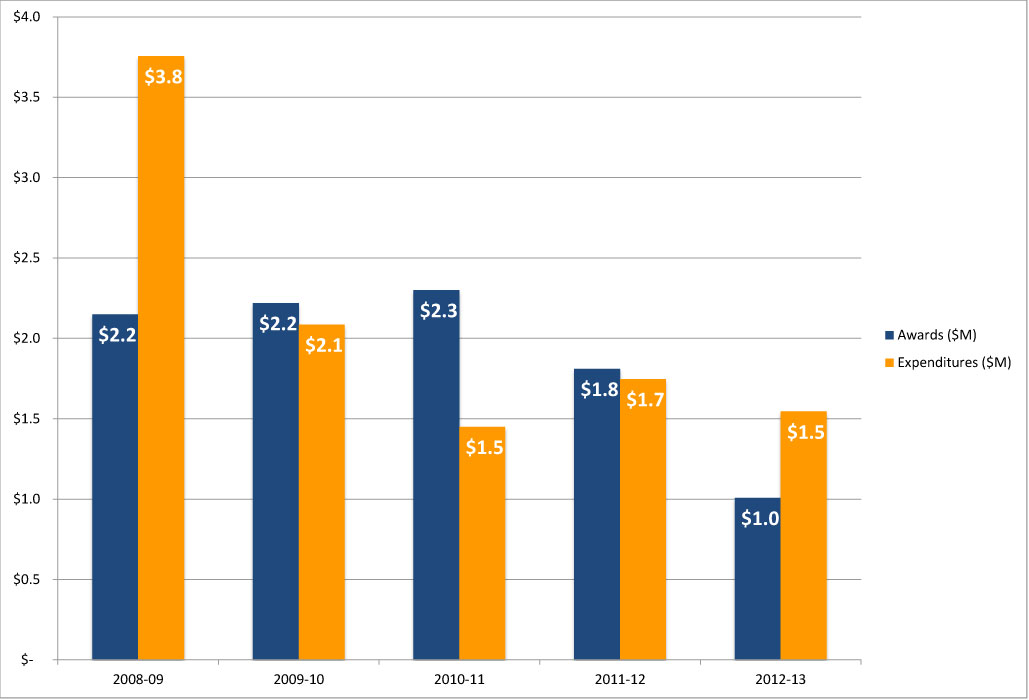Department of Mechanical and Materials Engineering2012-2013 Annual ReportDepartment OverviewThe Mechanical and Materials Engineering department has 20 faculty members who support its offerings of BS (ABET accredited), MS in ME and MSE, and PhD programs in ME and MSE. The department has over 500 undergraduates and 75 graduate students. Research is supported by several research facilities, the Engineering Manufacturing Center, the Advanced Materials Engineering Research Institute (ameri.fiu.edu), the Motorola Nanofabrication Facility and the Center for Study of Materials at Extreme Conditions (cesmec.fiu.edu). The department’s faculty research areas include:
The 2012-2013 year saw an increase in student enrollment and degrees awarded. One faculty member was recognized as a fellow of his professional society. Students and student societies won several awards. The department gained two new faculty members starting in fall 2013. On the other hand, the external funding was down, primarily for its many defense contracts and grants that did not materialize. The student body at the undergraduate level was increased by about 23%, while graduate enrollment remained steady. The Department graduated a record high number of 80 students with BS degrees, in addition to 11 MS and 7 PhD students receiving their degrees. With partial support from the University Graduate School, the department sponsored lectures from more than 10 esteemed scientists in its graduate lecture series. Student AchievementsThe Materials Advantage student chapter at FIU won yet another Chapter of Excellence award. This is the seventh time out of the last 10 years of competitions that FIU Materials Advantage has won awards and accolades at the national level. Andres Tremante won the Honorable Mention Award from the international construction giant Oderbrecht for his student teams placing fourth, fifth and sixth in the 2012 Odebrecht Award for Sustainable Development competition. Two doctoral students of Chunlei Wang received accolades – Majid Beidaghi’s work was highlighted in Material Views, and Varun Penmatsa made the cover of Nanowerk. Jiuhua Chen’s doctoral student, Shah Najiba won the Provost Award for Outstanding Paper that was published in the National Academy of Sciences’ journal. Michael Page, advised by Surendra Saxena, won the US-Japan NSF Fellowship.[ Faculty Accomplishments and HighlightsThe faculty published 77 journal papers, 46 conference proceedings, two (2) books, five (5) monographs, seven (7) book chapters, and 10 technical reports. Surendra Saxena and a team of international scientists published a book on the chemical thermodynamics of tin. Jiuhua Chen received an award at the 2012 Faculty Convocation for his excellence in research. Arvind Agarwal was named the ASM International Fellow. Bilal El-Zahab was named a Kauffmann Pino Entrepreneurship Center Professor and received funding for his innovative project. Cheng-Xian (Charlie) Lin is the Director of the Computational Fluids and Energy Sciences (CFES) Laboratory, and Sustainable Energy and Transport Systems (SETS) Laboratory. Current research include testing of compact heat exchangers, development of geothermal heat pump systems, numerical simulation of combustion processes, data center thermal management and building energy simulation. Dr. Bilal El-Zahab is an expert in the area of nanomaterials for energy applications. His doctoral work focused on nanomaterials for applications in biofuel synthesis and carbon dioxide utilization. In his postdoctoral research, he developed new fluorescent, magnetic, and other functional nanomaterials composed of ionic liquids. In his most recent postdoctoral research Dr. El-Zahab worked on the development of electrolytes and polymeric separator membranes for secondary lithium-ion batteries. He was also part of a team developing a new rechargeable lithium-ion semi-solid flow battery that utilizes liquid lithium suspension “fuel” aimed at applications in automotive industry. He brings in expertise in nanofabrications, ionic liquids, and energy storage to build a vibrant research group centered on the development of advanced materials addressing energy problems. Dr. Benjamin Boesl is a new addition to our faculty. His research has focused on material response and design of multiscale hierarchically designed composites including the use of 3D weave technology and nanoparticle fillers. His future research will address the development of novel experimental testing procedures using electron microscopy, materials development, and the advancement of dynamic computational tools and progressive failure techniques to improve the accuracy and scope of material modeling in defense, energy, and biomedical applications. Dr. Arvind Agarwal runs three labs in which he uses his plasma forming lab to enhance the properties of metal and matrix composites with Carbon Nanotubes. His Nanomechanics and Nanotribology Lab characterize nanoscale mechanical properties. His High Temperature Tribology Lab measures material properties when materials are operated at high temperatures. He also directs Advanced Materials Engineering Research Institute (AMERI) that contains the Motorola Nanofabrication Facility, which is supported by class 100 and 1000 clean rooms and nanofabrication capabilities. These faculties are open access, which means members of your company, after completing on-line training, can use the facility or you can choose to use the staff at AMERI for microsystems fabrication or analytical analysis to you specification. Dr. George Dulikravich works in the optimization and multidisciplinary, analysis, inverse design, optimization and robust control areas and has a 280 parallel processor core for heavy duty numerical calculations. He works in thermofluid, materials and fluid dynamics problems, design and constrained optimization in turbomachinery, and multi-objective optimization of chemical compositions of alloys. Dr. Surendra Saxena works with synthesis of super hard materials, carbon sequestration and hydrogen production. His laboratories can characterize most materials by X-ray diffraction and Raman spectroscopy. CeSMEC, the Center for the Study of Matter at Extreme Conditions, has all facilities to create super hard materials such as diamonds and experimentally simulate the planetary interior. The researchers study methods of hydrogen production and storage of energy Dr. Chunlei Wang’s research interest lies in the understanding of the physics of multifunctional materials such as various types of carbon (especially diamond and glassy carbon), gallium nitride which is the basis of blue lasers, and newly developed nanoscale materials (such as carbon nanofibers, Si nanowires and Ni nanowires). A natural outgrowth of this scientific interest in materials is the technical challenge and opportunities for synthesis, processing and the utilization of these materials in various application fields (such as: electronics, optoelectronics, energy, biological and chemical sensors) in state-of-the-art micro- and nano-fabrication technology. Her current research fields include (1) CVD diamond, (2) MEMS, NEMS and BioMEMS, especially for energy application and biosensor application, (3) drug delivery and (4) lab-on-chip technology. Fall Term EnrollmentDegrees AwardedSponsored Research Awards and Expenditures
|


